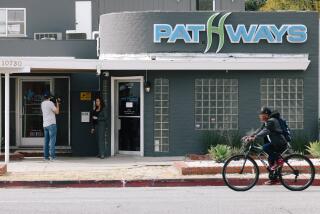Kevorkian Found Not Guilty of Aiding 2 Suicides
- Share via
DETROIT — Dr. Jack Kevorkian, the renegade physician seeking to legalize assisted suicide, was acquitted Friday on charges of helping two terminally ill patients kill themselves.
It was the second time since 1994 that Kevorkian was found not guilty of violating Michigan’s now-expired ban on assisted suicides. Kevorkian has helped 27 people to end their lives since 1990.
The thin, frail-looking retired pathologist sat passively as the jury in Pontiac, Mich., read the not-guilty verdicts. He then broke out in a smile and his supporters cheered. If convicted, Kevorkian could have faced up to four years in prison on each count.
“This is a stroke in favor of rationality and human rights,” the 67-year-old Kevorkian said.
The verdict came just two days after the U.S. 9th Circuit Court of Appeals ruled that a Washington state law making physician-assisted suicide a felony was unconstitutional. That landmark ruling raises the likelihood that the U.S. Supreme Court will ultimately determine whether individuals have a right to end their lives if they so desire.
Oakland County (Mich.) Circuit Court Judge Jessica Cooper said only Michigan law could be considered in the Kevorkian case, and therefore the appeals court ruling was not applicable.
The jury deliberated for nine hours over two days before finding Kevorkian not guilty in the deaths of 72-year-old Merian Frederick of Ann Arbor, Mich., and Dr. Ali Khalili, 61, of Chicago.
Both were terminally ill: Frederick suffered from Lou Gehrig’s disease and Khalili suffered from bone cancer. They both died by breathing carbon monoxide in a suburban Detroit apartment where Kevorkian once lived.
Kevorkian was tried under the now-expired state law that was rushed into effect by the Michigan Legislature in 1992 in an effort to curb his growing list of assisted suicides. The law expired without being replaced.
The Michigan Supreme Court since has ruled that there is a common-law ban on assisted suicide. Kevorkian faces another trial in April under common law involving two other assisted suicides in which he was involved in 1991.
In the most recent trial, Kevorkian attorney Geoffrey Fieger argued that his client did not break the law because his intent was not to kill the patients, but to relieve their suffering.
“This is not about the right to die,” Fieger said. “This is about the right not to suffer.”
He noted that Michigan’s ban on assisted suicide exempts someone who provides medication or uses procedures that hasten death, as long as the intent was to relieve pain and not to kill.
Several jurors said that they voted to acquit based on the judge’s instructions that they had to determine whether Kevorkian acted to “cause death or end suffering.”
“It all came down to the word or,” said juror Jill Hubbard.
Jurors reported that at least three members of the 12-person panel favored conviction at the beginning of deliberations. But the majority convinced them that Kevorkian had acted within the intent of the law.
The acquittal is unlikely to quell the debate swirling around Kevorkian or assisted suicide any time soon.
Kevorkian made it clear that he did not intend to stop his efforts to make assisted suicide legal or to help terminally ill patients. A major target for Kevorkian, who has had his license suspended in California and Michigan, is the medical establishment, which opposes his death-on-demand crusade.
“The enemy is the organized medical association who has declared this unethical and have intimated all doctors from participating,” Kevorkian said.
Thomas Reardon, chairman of the American Medical Assn.’s task force on assisted suicide, said that Kevorkian’s acquittal Friday was a blow to quality, compassionate care. “It sends a message that the dignity and value of human life at its end stages is irrelevant,” he said.
Oakland County Prosecutor Richard Thompson said the jury’s decision was based more on emotion than law. He also criticized the trial judge for giving confusing instructions to the jury.
More to Read
Sign up for Essential California
The most important California stories and recommendations in your inbox every morning.
You may occasionally receive promotional content from the Los Angeles Times.













